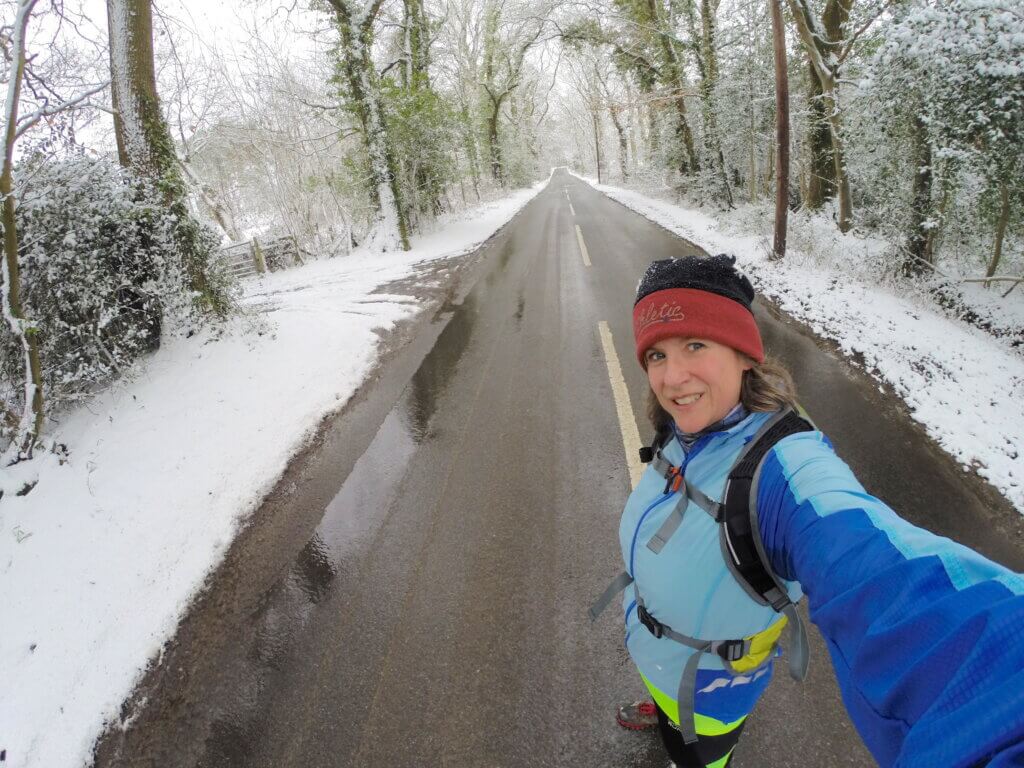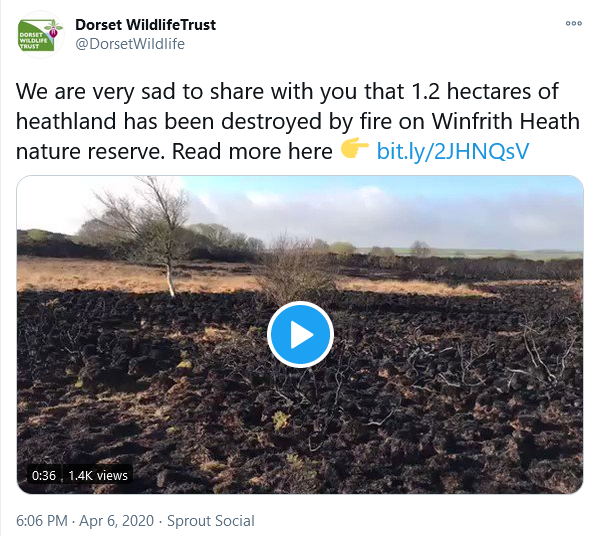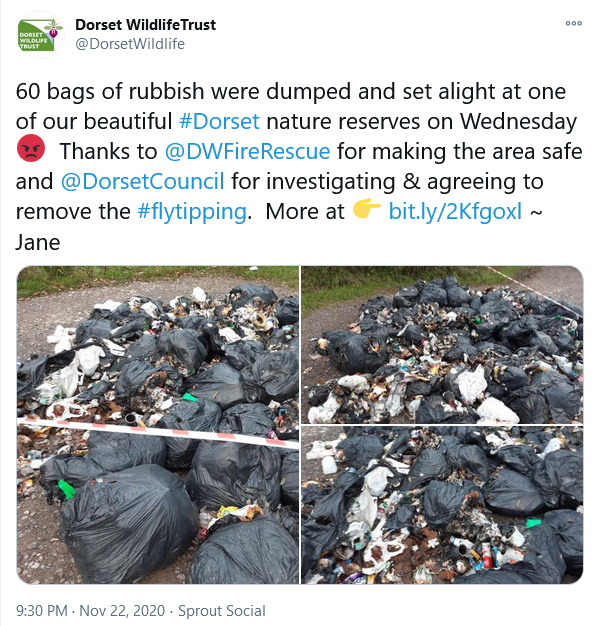
Jane is a naturalist, photographer and nature writer living in Dorset. Her work has appeared in books, anthologies and blogs for charities such as The Wildlife Trusts and the International Bee Research Association. When she’s not exploring Dorset’s lanes and countryside she can be found lying on her stomach watching insects in her garden. Jane is currently studying for an MA in Travel and Nature Writing at Bath Spa University and can be found: www.janevadams.com and on Twitter @WildlifeStuff Jane’s previous Guest Blogs here can be found here.
This year I’ve lost count of how many times I’ve read or heard people say, “at least nature has benefited from lockdown”. At first I really wanted to believe the tweets, articles and conversations, then I started to feel a bit uncomfortable. It was said as if it was fact, but was it?
I’m not disagreeing that, for a short time during the first lockdown, the air did seem less polluted. It was easier to hear the bird song without the background hum of traffic, and fewer animals were being killed on our roads. But now, as we head into December, the growl of the traffic seems louder than ever.
Many will say that I live in a clossetted bubble in Dorset, and I wouldn’t dispute that. So far, I haven’t found lockdown difficult. Apart from dodging the virus, and working from home, I’m lucky to have beautiful lowland heaths, woods and chalk streams right on my doorstep. But even in these picture-perfect surroundings it hasn’t taken much digging to find a different reality.
Trouble in paradise
This spring, after a prolonged spell of warm, rain-free weather, Dorset’s heaths were tinder dry. It was the 5th of April when I saw the first news report of a fire at Winfrith Heath nature reserve(1).

1.2 hectares of lowland heath, home to rare plants and the nesting site for Dartford warblers, nightjars, smooth snakes and sand lizards, had gone up in smoke killing thousands of creatures and plants. Photographs on Twitter showed the charred remains. It was heartbreaking. No reason for the fire was found.
During the next six weeks there were four more fires at important nature sites in Dorset, culminating in a large fire at Wareham Forest, a site with a mix of heathland and conifer plantation.
One-hundred and fifty firefighters struggled for ten days to get the fire under control. From my bedroom window I watched as grey plumes of smoke rose in the distance and over 220 hectares disappeared under the flames.
Not only was Covid-19 taking the lives of our loved ones, now life was being wiped-out in our countryside too.
Unsurprisingly these fires didn’t just ‘happen’. Dorset & Wiltshire Fire Service confirmed the cause each time as either deliberate arson or human carelessness. After the Wareham fire eleven disposable BBQs and the remains of several campfires were discovered.
Nature left to its own devices
Much of the land near to where I live is owned by my local Wildlife Trust. During the first lockdown many Trust staff were furloughed and all volunteering ceased. Projects were put on hold and public engagement events were cancelled. Biological recording, normally undertaken by volunteers, and all but the most essential maintenance, monitoring and conservation work, was stopped dead in its tracks.
To try and protect the local nature reserves, Brian Bleese, Dorset Wildlife Trust’s CEO, pleaded with local people to “comply with the guidance which is displayed clearly at the entrances to our nature reserves,” and asked people not to “forget the reason these sites exist to begin with – for the benefit of wildlife”. (2)
I haven’t ventured far since March, even after lockdown eased in the summer I stayed within walking distance of home, but I was starting to notice subtle changes in the countryside. At my local nature reserve (two fragments of rare wildflower meadow), where there had once been a lightly trodden path around the perimeter, a ten foot wide path of trampled foliage now looped round and across both meadows, and dogs bounded through the long flower (and wildlife) rich grass, chasing rabbits.
I visited at dusk one summer’s evening, selfishly hoping to be the only visitor, fifteen other people were already there – I’d never seen it so busy. Sidestepping two piles of dog shit and placing a plastic Coke bottle in a bin just a few feet away, I hurriedly made my way to the gate.
Pressure from increased footfall at this tiny reserve was obviously having an impact, and, as I was a visitor, I knew I was part of the problem. The bullfinches that normally nested in the hedges were nowhere to be seen, and I wondered how many green-winged orchids had been unknowingly trampled earlier in the spring; a few years ago there had been fourteen thousand, this year numbers seemed to be very low, maybe only a few thousand.
At tipping point
After my visit to the meadows I tried to stick to the country lanes on subsequent walks. Many people were doing the same, so any walk entailed quite a bit of ‘Covid-dancing’ as we do-si-doed around each other at the prescribed two metre distance, and the more I walked the more I became aware of the fly-tipping.
With commercial and public waste sites closed during the first lockdown more laybys seemed to have acquired either a mattress, a dismantled shed, rubble or piles of brightly coloured broken toys.
By August my local Wildlife Trust had started appealing for donations to help ‘repair, renew and rebuild’ in order to help with, ‘restoring our nature reserves and reversing the adverse effects of the Covid-19-related restrictions’.(3)
If anyone had any doubts as to whether this was a ‘real’ problem, in mid-November sixty (yes, sixty) bags of rubbish were fly-tipped and set on fire at Powerstock Common (4), another of Dorset Wildlife Trust’s nature reserves.

A disconnect
Not long after the fire at Wareham Forest local councillors agreed that something had to be done to “control or prohibit barbeques and other fire related activities”(5) on designated land, and that Public Spaces Protection Orders (PSPO) “could be the most effective method of formal control”. They requested a detailed options paper to look at the problem. Sadly, the wheels of local government turn slowly – especially during a pandemic it seems – I’ve seen no further update.
But is controlling or prohibiting the use of BBQs really the answer? Only a few weeks after the Wareham Fire, as England experienced a mini-heatwave and half a million people descended on the Dorset coast, Police found fifteen people illegally having a BBQ in Wareham Forest – right next to the previously burnt heathland. I doubt whether a PSPO would have stopped them from having their BBQ.
Don’t all these problems; the fires, vandalism, littering, fly-tipping, even the possible overuse of nature reserves, have one thing in common – a disconnect with nature? Is there a general lack of understanding about the pressures on our wildlife, countryside and marine environments? Maybe even a disconnect from the reality that local flora and fauna is struggling for survival?
I’m reminded of part of a speech Rachel Carson, the great American writer of The Silent Spring, gave in 1952. It seems strangely apt in 2020.
“If we have ever regarded our interest in natural history as an escape from the realities of our modern world, let us now reverse this attitude. For the mysteries of living things, and the birth and death of continents and seas, are among the great realities.” (6)
Sadly, I don’t know how we solve this disconnect between people and nature – other than continuing to reach out, explaining the scientific facts, and nurturing a respect for the natural world. Maybe finding an answer to the disconnect should be more of a priority for people like me who are conservation and environmental communicators and writers?
If there’s been one benefit of lockdown for the environment, it isn’t the way it has helped nature, at least not in Dorset, it’s that it has given me time to realise what I’ve been doing wrong.
References:
- https://www.dorsetwildlifetrust.org.uk/news/fire-winfrith-heath-nature-reserve-destroys-12-hectares-wildlife-habitat
- https://www.dorsetwildlifetrust.org.uk/news/dorset-wildlife-trust-urges-public-follow-wildlife-safety-advice-nature-reserves
- https://www.dorsetwildlifetrust.org.uk/news/60-bags-rubbish-dumped-and-set-alight-powerstock-common-nature-reserve
- https://www.dorsetwildlifetrust.org.uk/recovery
- https://moderngov.dorsetcouncil.gov.uk/documents/s19630/final%20Cabinet%20report%20-%20-barbeque%20Rec%202%20amended%20CL.pdf
- https://publicism.info/environment/woods/14.html
I was always taught, leave no trace!
It seems the younger generations have never been shown or taught how to camp responsibly.
I love going camping and have camped in places I shouldn’t lots of times.
However, unless you caught me you would never know I had been there.
I an not convinced that this is a generational problem. Sadly there seem to be people of all ages who behave in a selfish and anti-social manner. There are also people of all ages who care and who trying to improve things.
I agree with Jonathan, I’m not sure it’s confined to the younger generation. If only we could round them all up and talk to them – a bit like one of those speed awareness courses when you’re caught speeding. I’d love to understand why they do it, and what we need to do to change their behaviour.
There is a simple answer to all this: we need more space close to where people live, not way off in the uplands. And the space is there – left over from a policy from 70 years ago, intensive farmland sweeps unquestioned up to the urban fringe when we should have places people can go around our towns and cities. An idea that is close to the heart of Government – the Government’s own Natural Capital Committee found that there was good evidence to support the economic case for 250,000 hectares of ‘community forest’ around our towns and cities – a recommendation that conservation and access organisations, which talk about little else than contact with nature, obviously will have grasped with both hands. Not a bit of it – not one single squeak have I found in all the membership magazines, not one mention of this incredible opportunity to make the case within Government itself. Could the time ever be better to grasp the zeitgeist of a people at last awaking to the importance of the environment on their doorsteps ?
I think maybe it might be slightly different here in east Dorset. We don’t really have any ‘uplands’ for them to be sent to (maybe the Purbecks or the Jurassic Coast?), there’s already open spaces and nature reserves wedged right up against our towns and villages – along with green belt land that’s about to be built on – but, during lockdown, all these areas had very heavy use (even the protected SSSI and RAMSAR sites). However, local charities and councils are developing large ‘local nature parks’ – and this at least fills me with ‘some’ hope for the future.
I fear, Jane, that the only disconnect in the people responsible for the things you highlight is in their souls. I struggle to even begin to understand people who visit the coast and countryside, presumably because they enjoy doing it, yet seem to be compelled to leave a ‘calling card’, anything from a gift-wrapped dog turd to the remains of their family picnic. There is something missing in the hearts and minds of people who do these things and, unfortunately for our society, they appear to be numerous.
Although I do agree that it’s hard to understand, I still have hope (I’m an eternal optimist) that we can change people’s behaviour – even if it has to be on a one by one, face to face basis. It’s a difficult problem. Bigger consequences for those that are found guilty would be a start – similar to the speed awareness course you get when caught speeding?
Regarding fly-tipping: It’s a criminal activity that benefits from being conducted in places with a low risk of detection. I really can’t see that the perpetrators need a disconnection from nature to motivate their crimes or that they will respond to “education” and “outreach” to engender any respect for society, let alone the natural world.
Perhaps local authorities might help by facilitating opening hours and access to public waste sites instead of introducing progressive restrictions which drive people to seek help to dispose of their trash and supports this cash-in-hand market for criminal services.
Sadly all our public and commercial waste sites are now open – and yet it’s still happening. The cost to dump isn’t helping – but I understand why it has been brought in. I would love to meet someone who has fly-tipped and get into their brain, just a bit. Fruitless, possibly, but I’m an optimist.
Lots of my local wood has been trashed too by the widening of paths associated with larger footfall and prioritising a microscopic gain in human safety over the benefit to other species.
Too many of us in the UK at one time perchance? (As well as all the other problems.)
Yes, I agree, far too many. Sadly I can’t see us solving that problem in a hurry, if ever.
You forgot the photographers. There was a nice glade in a wood ringed by orchids, but the wood is notorious for an unusual butterfly. By the end of its flight period the glade was flattened by photographers pushing to the shrubs to get that millionth photo.
Some are pushing for a right to roam everywhere. Which will allow walkers to take a different route every day and their racing spaniel (not really breedist but they are the best) to clear ground and low nesting birds from even more land.
Maybe this has something to do with the deafening enthusiasm for urban forests. If you are going to invest your limited money in a wood for wildlife the urban fringe is not the place you would choose.
A forage grass breeder I knew in the ’70s ran trials of potential new varieties on the outskirts of a large town in the Home Counties in fields backing on to a housing estate. One of the cryptic abbreviations he used for assessment was “ff”. The second word was “flat”.
I’m a photographer, but I shun the crowds. However, I’ve seen similar here in Dorset. Along with illegal disturbance just for a photograph.
As you say, Jane, there appears to be a disconnect and for many people nature just doesn’t feature in their lives. Education might be the answer for the young but the concentration on exams and targets leaves little space for other activities. And for the older groups I am not sure. My father grew up in the Blackmore Vale, swam in the Stour, fished but also collected birds eggs and butterflies (so abundant then). He was a country boy but had little real respect for nature and I remember having long arguments with him about the M3 and Twyford Down.